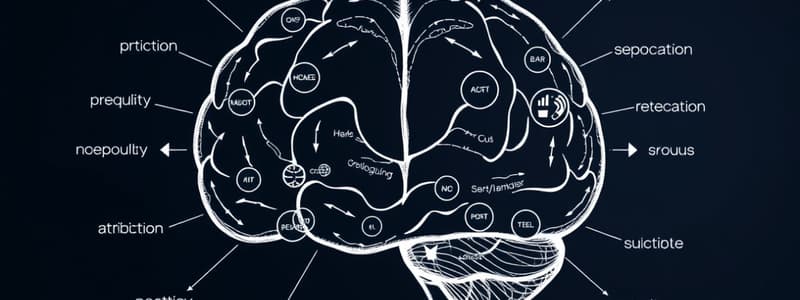Podcast
Questions and Answers
What does social psychology study?
What does social psychology study?
- How we act alone
- How we act around friends
- How we think about, influence, and relate to one another
- All of the above (correct)
What is Attribution Theory?
What is Attribution Theory?
It is the process of explaining someone's behavior, by attributing it to their personality or situational factors.
What is the Fundamental Attribution Error?
What is the Fundamental Attribution Error?
It is the tendency to underestimate situational influences on someone's behavior and overestimate personality factors.
If we believe someone is mean, we may feel dislike for them and act ___.
If we believe someone is mean, we may feel dislike for them and act ___.
What is Central Route Persuasion?
What is Central Route Persuasion?
What is Peripheral Route Persuasion?
What is Peripheral Route Persuasion?
What is the Foot-In-The-Door Phenomenon?
What is the Foot-In-The-Door Phenomenon?
What is a Role in social psychology?
What is a Role in social psychology?
What is Cognitive Dissonance Theory?
What is Cognitive Dissonance Theory?
What does Conformity refer to in psychology?
What does Conformity refer to in psychology?
What is Normative Social Influence?
What is Normative Social Influence?
What is Informational Social Influence?
What is Informational Social Influence?
What is Social Facilitation?
What is Social Facilitation?
Flashcards are hidden until you start studying
Study Notes
Social Psychology
- Studies how individuals think, influence, and relate to each other in different social contexts.
Attribution Theory
- Explains how we attribute behaviors to traits or situational factors. Example: attributing Dink's grouchy behavior to her personality rather than her lack of sleep.
Fundamental Attribution Error
- Tendency to overemphasize personal characteristics and underestimate situational factors in others' behavior. Example: assuming Dink is grouchy without considering her circumstances.
Attitude
- A person's evaluation of others can influence feelings and behaviors. Example: believing someone is mean may lead to unfriendly actions toward them.
Central Route Persuasion
- Involves convincing someone through strong, relevant arguments. Example: a restaurant promoting food quality in ads to persuade viewers.
Peripheral Route Persuasion
- Persuasion through superficial cues rather than focusing on the content. Example: restaurant ads featuring attractive models instead of food quality.
Foot-In-The-Door Phenomenon
- The tendency to agree to smaller requests makes it easier to agree to larger ones later. Example: Dink agreeing to a monthly car payment makes her more likely to accept additional features.
Role
- Expected behavior patterns in specific social contexts. Example: Dink adapting to her new role as a college student at Harvard over time.
Cognitive Dissonance Theory
- The discomfort from holding conflicting beliefs or attitudes leads to rationalization. Example: Americans redefining the war's purpose to reduce dissonance after failing to find WMDs.
Conformity
- Adopting behaviors, attitudes, or beliefs to align with group norms. Example: a junior high student going along with older peers’ incorrect answer in a math discussion.
Normative Social Influence
- Changing behavior to fit in and avoid rejection. Example: Dink discarding old shoes to conform to popular trends.
Informational Social Influence
- Seeking guidance from others when unsure. Example: individuals turning to police for advice in ambiguous or crisis situations.
Social Facilitation
- Increased performance on tasks when being observed by a group. Example: Dink racing faster due to the support and presence of a cheering audience at her ostrich racing events.
Studying That Suits You
Use AI to generate personalized quizzes and flashcards to suit your learning preferences.




